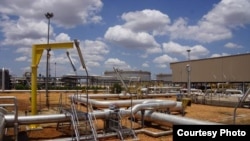JUBA, SOUTH SUDAN —
South Sudan’s Council of Ministers has submitted a $5.6 billion dollar national budget to parliament for the new fiscal year, more than double the country’s current austerity budget.
But officials warned that they are prepared to slash spending if oil production is shut down again over a new row with Sudan, which has accused Juba of backing rebels in the north and threatened to stop shipping South Sudanese oil, the backbone of the new country's economy.
The South Sudanese government imposed an austerity budget after it shut down oil production in early 2012 following a disagreement with Khartoum about the cost of transporting oil through pipelines in Sudan to export ports. Crude oil sales account for 98 percent of the South Sudan's revenue.
The country’s new fiscal year starts in July, but austerity measures, which budget for about $1 billion in spending every six months, will remain in place through the end of the year, even though South Sudan resumed oil production in April, said government spokesman Barnaba Marial Benjamin.
If Sudan does not block South Sudanese exports, spending will increase significantly for fiscal year 2014, Marial said.
“When it is flowing, then there is money which will come… As from January 2014, the budget will revert to 17.33 billion South Sudanese pounds,” or around $4.33 billion, he said.
Most of the budgeted money will be used to improve key areas like agriculture, infrastructure, health and education, Marial said, though he declined to provide specific figures for each sector or identify new projects.
On the other hand, if Khartoum follows through with threats made last week to close the pipeline carrying South Sudanese crude to seaports for export, "a contingency budget can be arranged to exclude the oil revenue,” Marial said.
The government would still have non-oil revenue worth an estimated $483 million, a $50 million loan from the World Bank and ongoing donor assistance, he said.
The proposed budget will be debated in parliament starting next week.
But officials warned that they are prepared to slash spending if oil production is shut down again over a new row with Sudan, which has accused Juba of backing rebels in the north and threatened to stop shipping South Sudanese oil, the backbone of the new country's economy.
The South Sudanese government imposed an austerity budget after it shut down oil production in early 2012 following a disagreement with Khartoum about the cost of transporting oil through pipelines in Sudan to export ports. Crude oil sales account for 98 percent of the South Sudan's revenue.
The country’s new fiscal year starts in July, but austerity measures, which budget for about $1 billion in spending every six months, will remain in place through the end of the year, even though South Sudan resumed oil production in April, said government spokesman Barnaba Marial Benjamin.
If Sudan does not block South Sudanese exports, spending will increase significantly for fiscal year 2014, Marial said.
“When it is flowing, then there is money which will come… As from January 2014, the budget will revert to 17.33 billion South Sudanese pounds,” or around $4.33 billion, he said.
Most of the budgeted money will be used to improve key areas like agriculture, infrastructure, health and education, Marial said, though he declined to provide specific figures for each sector or identify new projects.
On the other hand, if Khartoum follows through with threats made last week to close the pipeline carrying South Sudanese crude to seaports for export, "a contingency budget can be arranged to exclude the oil revenue,” Marial said.
The government would still have non-oil revenue worth an estimated $483 million, a $50 million loan from the World Bank and ongoing donor assistance, he said.
The proposed budget will be debated in parliament starting next week.




